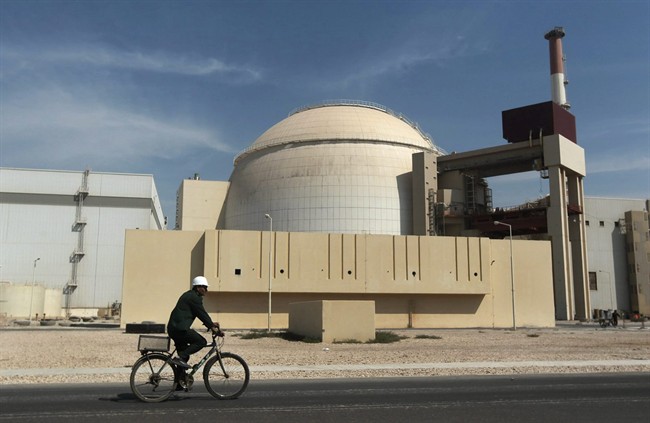A final resolution on Iran’s nuclear program is not expected to come out of the latest round of talks between the Islamic Republic and the permanent members of the UN Security council plus Germany, referred to as the P5+1.

But the words “cautious optimism” have been used to describe the potential of Iran giving up on uranium enrichment, which it insists is for nuclear power, not nuclear weapons.
The second round of talks got underway in Geneva on Tuesday for the second time this year and for the first time under the administration of recently-elected President Hassan Rouhani.
Foreign Minister Javad Zarif is leading the Iranian delegation.
Zarif said a compromise on Iran’s uranium enrichment can be reached and hopes international sanctions will be lifted.
READ MORE: Iran rejects West’s demand to ship out uranium stockpiles
“We believe that the nuclear issue can be resolved in one year and Iran’s nuclear issue can turn into an ordinary matter in the International Atomic Energy Agency (IAEA) provided that the opposite side has goodwill,” Zarif said Monday, upon arriving in Geneva, Iran’s state-run Press TV reported.
“I am hopeful that by Wednesday we can reach agreement on a road map to find a path towards resolution. But even with the goodwill of the other side, to reach agreement on details and start implementation will likely require another meeting at ministerial level,” Zarif reportedly said in a Facebook post on Tuesday.
In a PowerPoint presentation at Tuesday’s round of talks, Iran set out a six-month timeline to reach an agreement, but details of the closed-door discussions were not made public.
An unnamed U.S. official told the Guardian the talks are an attempt at building up trust, “to constrain the program and even take it back a notch.”
“To get to a comprehensive agreement is very, very difficult with highly technical issues that have to be resolved. We are looking for a confidence-building step that will put some time on the clock,” the official said.
George Perkovich, Nuclear Police Program Director at the Carnegie Endowment for International Peace, said he believes this is the best opportunity in more than a decade to get things moving in a positive direction.
“I think it’ll take time, but you ought to be able to see relatively quickly an agreement on the basic principles, the basic framework of a deal,” Perkovich told Agence France Presse.
But, in a letter sent to U.S. President Barack Obama, some members of the U.S. Senate expressed their belief that sanctions have more power than words.
“We reaffirm that a credible military threat remains on the table and we underscore the imperative that the current sanctions be maintained aggressively, and call on you to increase pressure through sanctions already in place,” a bipartisan group of senators said in the letter, The Hill reported.
READ MORE: New sanctions likely despite thaw in U.S.-Iran ties
“What has got Rouhani to the negotiating table are the existing sanction(s) and we’ve got to have the leverage to increase that to make certain that they understand we’re serious about having them end their nuclear weapons program,” Republican Sen. Ed Royce told CBS News.
Foreign Policy took a look at some of the reasons why the U.S. and the other powers don’t necessarily have leverage over Iran’s nuclear ambitions, it would be unlikely the country would pull the plug on its centrifuges.
“… While a permanent end to Iranian enrichment would be ideal, it is also highly unrealistic. The Iranian regime has invested enormous amounts of political capital and billions of dollars over decades to master the knowledge and centrifuge technology associated with uranium enrichment — and nothing will put that genie back in the bottle,” Colin H. Kahl and Alireza Nader wrote.
As Iran and the P5+1 discuss the nuclear issue, Israel again warned the international community about trusting Iran.
In marking the 40th anniversary of the Yom Kippur War, in a special ceremony in the Knesset, Israeli Prime Minister Benjamin Netanyahu said “It would be a historic mistake to lift the sanctions, just before they are really effective.”
“International pressure is what brought the Iranians to a level of concessions,” Netanyahu said in a speech on Tuesday.
READ MORE: Canada, Israel show no sign of lightening tone or sanctions on Iran
“Iran can quickly enrich uranium at 3.5 percent to 90 percent – which is necessary for a nuclear weapon. Iran is currently willing to give up on 20 percent – which is no longer important, in exchange for serious easing of sanctions,” he said.
It also appears Netanyahu isn’t afraid of a perceived threat, saying one of the lessons learned from the Yom Kippur War is that “pre-emptive strikes must not be ruled out.”
“Such strikes are not necessarily called for in every case and matters must be given due and careful consideration but there are situations in which thinking about the international response to such a step is not equal to the bloody price we would pay in absorbing the strategic blow we would be compelled to respond to later, perhaps too late.”




Comments